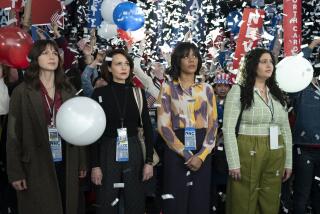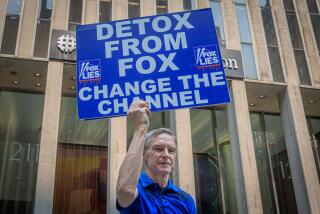One More Election Embarrassment for the Press: Bush Cousin
- Share via
Add to the press’ defeat in Election 2000 the latest embarrassment: The election night call declaring George W. Bush winner did not come from the news media polling group Voter News Service. It came first from the political desk of the Fox News Channel, which was being run by Bush’s first cousin, John Ellis. The other networks quickly followed, pressured by Fox’s decision.
The collective error helped create the suggestion of a race won by Bush, and then recalled. That is fostering the idea among Bush supporters that the election could be “stolen” from Bush on a technicality. And it is fostering the idea among Al Gore’s supporters that the vice president was finessed into conceding to Bush before the vote count actually indicated the Texas governor had won the race.
Ellis’ role in this incident raises the question: Does it really matter how close journalists are to those they cover? The short answer is yes.
Today, the notion that the press is an independent institution, a reputation that was hard-won over the last 150 years, is eroding. This is occurring not only in the political arena but also in the economic world, where journalism is becoming a subsidiary to larger corporate interests such as ABC inside Disney, or Time Inc. magazines inside AOL. The biggest threat of the information revolution is that we could lose journalism as an honest referee of the public square on behalf of citizens.
The Ellis incident is indicative of a larger problem of the public’s confusion between politics and journalism. It’s nothing new to have people move between the two. But at a time when journalism is becoming more confused with the other worlds of media--fiction, infomercial, infotainment and political propaganda, which we now politely call “spin”--problems such as the Ellis incident have become more accepted, while at the same time creating greater confusion for the public.
For example, William Kristol remains a Republican strategist while also working as the editor of the Weekly Standard. Sidney Blumenthal’s coverage of the Clinton campaign for the New Republic in 1992 had already raised eyebrows among journalists even before he confirmed their suspicions of favoritism by going to work for the Clinton administration. George Stephanopoulos went from presidential advisor to ABC News analyst, and now he is being “recast,” in the words of one executive, as a journalist. Arianna Huffington blithely moved from political wife to Newt Gingrich insider to conservative columnist to political reformer.
Ellis, whom I have met, is a good man. He is also a family man, first. Only a few months earlier, Ellis gave up his Boston Globe column, explaining, “I am loyal to my cousin, and I put that loyalty ahead of my loyalty to anyone else outside my immediate family.” He should have stuck with that decision.
For the last three years, the Committee of Concerned Journalists, a consortium of news people nationwide focused on the standards of the press, has explored the proper relationship between journalists and those they cover. This is what we heard: Today, the crux of journalism’s credibility, of providing the news without fear or favor, is the idea that a journalist puts citizens first--ahead of party affiliation, shareholder equity, advertiser preference or the boss’ whim. This is the implied covenant of American journalism, the thing that tells people that coverage, political or otherwise, is straight.
The key is that the journalist is independent. He or she is not without bias, personal preference or life experience. But the journalist is not an activist or partisan. Gil Thelan, the executive editor of the Tampa Tribune, calls the role of the journalist that of the “committed observer.” His commitment is to the whole community as a fair observer.
Independence does not mean neutrality. Columnists are not neutral. Writers from the alternative press are not neutral. But in addition to adhering to the same principles of accuracy and allegiance to citizens as other journalists, they must maintain a separation from faction. As conservative columnist Maggie Gallagher has put it, “I think it’s possible to be an honest journalist and be loyal to a cause. It’s not really possible to be an honest journalist and be loyal to a person, a political party or a faction.”
The reason is pragmatic. Independence gives you the intellectual freedom to make good judgments about fairness, accuracy, balance and the concerns of your audience--in other words, to write in a way that fairly lays out all the facts. Independence also allows you to present the news in a way that the public will believe it.
At a time when the public increasingly distrusts the press, this is no small matter.
More to Read
Get the L.A. Times Politics newsletter
Deeply reported insights into legislation, politics and policy from Sacramento, Washington and beyond. In your inbox twice per week.
You may occasionally receive promotional content from the Los Angeles Times.










